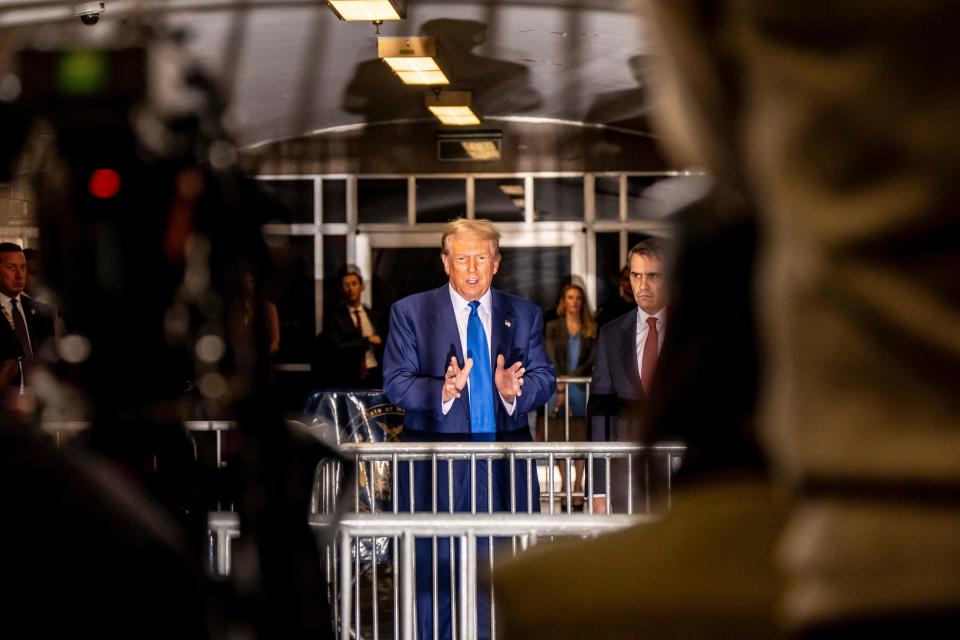Trump's jury asked to rehear the judge's 'rain metaphor' instruction — here's what that might mean
Jurors in Trump's hush-money trial asked the judge to reread his "rain metaphor" instructions.
Jurors seemed to want clarity on how to gauge Trump's intent in the hush-money scheme.
The jury found Trump guilty on 34 counts of falsifying business records related to Stormy Daniels.
The jury in former President Donald Trump's criminal hush-money trial had a specific request before starting deliberations on Thursday, during which they ultimately found the former president guilty on all counts.
The jury had asked to hear again what they described in a note as the judge's "rain metaphor" instruction.
It advises jurors that they can infer that it's raining — by seeing someone's wet umbrella, for example — even if they don't see the rain themselves.
The request suggested they were weighing Trump's intent, which can be only inferred, not proved.
By the end of the day, the jury had found Trump guilty of all 34 criminal counts related to a hush-money payment made to a porn star.
The rain metaphor is often used by judges in jury instructions.
It tells the jurors that they can infer certain facts from the surrounding circumstances using their common sense.
"Suppose you go to bed one night when it is not raining, and when you wake up in the morning, you look out your window," the judge, Justice Juan Merchan of the New York Supreme Court, told jurors, reading from the jury instructions he gave Wednesday.
"You do not see rain, but you see that the street and sidewalk are wet and that people are wearing raincoats and carrying umbrellas," Merchan told the jurors.
"Under those circumstances, it may be reasonable to infer — that is, conclude — that it rained during the night," the judge said.
"In other words, the fact of it having rained while you were asleep is an inference that might be drawn from the proven facts of the presence of the water on the street and sidewalk, and people in raincoats and carrying umbrellas," he added.
Jurors are paying close attention
Jurors were visibly engaged as they listened.
Juror three, a young corporate lawyer, and juror five, a charter-school teacher, each leaned forward in their seats in the front row of the jury box as Merchan read.
Juror four, a young male security engineer who sat between them, took notes.
Also taking notes was juror seven, a middle-aged lawyer who said during jury selection, "I'm a litigator, so I take the law seriously, and I take the judge's instructions very seriously."
As the judge described how to infer Trump's intent "beyond a reasonable doubt," the engineer, lawyer, and teacher scribbled hard on their white legal pads.
Meanwhile, juror 12, a physical therapist, held her hand to her chin as if she were concentrating during the recitation of the rain metaphor.
Juror 10 began taking notes as the judge explained how Trump may have violated campaign-finance laws — which could be a path to finding him guilty of the business-falsification charges.
Why intent matters
The jurors were considering 34 counts of falsifying business records as part of a scheme to cover up a hush-money payment to the porn star Stormy Daniels ahead of the 2016 presidential election. They deliberated for 4 ½ hours Wednesday.
On Wednesday afternoon, they asked for the judge to read back roughly a half hour of testimony. The request suggested they had dived deep into the details of the allegation that there was a conspiracy to influence the 2016 election by keeping Daniels quiet about an affair she says she had with Trump.
They asked for the rain metaphor, specifically, on Thursday morning.

Trump, who is 77 years old, does not use email or send text messages.
There is no evidence that he ever typed up a memo saying something like, "I'm going to falsify documentation of payments to my lawyer Michael Cohen in order to violate Section 17-152 of the New York Election Law, also breaking campaign-finance and tax laws along the way."
So to find Trump guilty, jurors needed to infer his role in the hush-money scheme based on the testimony and documents in the case surrounding him.
Thursday morning's jury request may've shown that jurors at that point had yet to agree on whether Trump intended to conceal some other crime when he caused business records to be falsified.
After the judge completed his recitation of the jury instructions, two of the court stenographers reread portions of the testimony. They playacted as the questioning lawyers and the witnesses who previously took the stand.
A middle-aged court stenographer with glasses sat in the witness-stand seat and played the roles of the ex-National Enquirer publisher David Pecker and of Michael Cohen, Trump's former attorney.
The jurors also asked whether they could have a pair of headphones with a 3.5 mm jack so that they could listen to audio recordings included on the laptop of evidence they had with them in the jury-deliberations room.
The judge said they could — and that he'd throw in speakers, too.
May 30, 2024: This story has been updated to reflect that the jury found Trump guilty on all counts.
Correction: May 30, 2024 — An earlier version of this story misstated the size of the headphone jack jurors asked for. They requested a 3.5 mm jack, not a 35 mm one.
Read the original article on Business Insider


